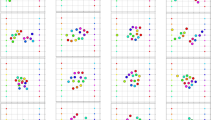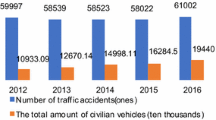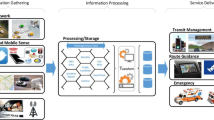Abstract
This study analyzes the problem of adaptive cruise control of vehicles in different driving cycles and divides diverse weight coefficient intervals for the vehicles under the different driving cycles to improve the adaptability of the vehicles in various environments. This paper first describes the driving environment of the adaptive cruise vehicle, and a model prediction algorithm with fixed weight coefficients is established to control the vehicle state. Then, a neural network is established to identify the vehicle driving cycles, the weight intervals are divided in accordance with different driving cycles, and the weight value is dynamically adjusted through fuzzy control. Lastly, the variable weight coefficients of different driving cycles are combined with the model prediction controller. The software cosimulation shows that the method designed in this paper plays a positive role in the fuel economy of adaptive cruise.
Similar content being viewed by others
References
Chen, H., Guo, L., Ding, H., Li, Y. and Gao, B. (2018). Real-time predictive cruise control for eco-driving taking into account traffic constraints. IEEE Trans. Intelligent Transportation Systems 20, 8, 2858–2868.
Chen, J., Yu, G. and Yan, X. (2020). Data based parameter setting method for adaptive cruise control. IEEE Access, 8, 15291–15302.
Chen, J., Zhou, Y. and Liang, H. (2019). Effects of ACC and CACC vehicles on traffic flow based on an improved variable time headway spacing strategy. IET Intelligent Transport Systems 13, 9, 1365–1373.
Chen, T., Luo, Y. and Li, K. (2011). Multi-objective adaptive cruise control based on nonlinear model predictive algorithm. IEEE Int. Conf. Vehicular Electronics and Safety (ICVES). Beijing, China.
He, D. and Peng, B. (2020). Gaussian learning-based fuzzy predictive cruise control for improving safety and economy of connected vehicles. IET Intelligent Transport Systems 14, 5, 346–355.
He, D., He, W. and Song, X. (2020a). Efficient predictive cruise control of autonomous vehicles with improving ride comfort and safety. Measurement and Control 53, 1–2, 18–28.
He, Y., Makridis, M., Fontaras, G., Mattas, K., Xu, H. and Ciuffo, B. (2020b). The energy impact of adaptive cruise control in real-world highway multiple-car-following scenarios. European Transport Research Review 12, 1, 1–11.
Jiang, B. and Fei, Y. (2015). Traffic and vehicle speed prediction with neural network and hidden Markov model in vehicular networks. IEEE Intelligent Vehicles Symp. (IV). Seoul, Korea.
Jing, J., Filev, D., Kurt, A., Özatay, E., Michelini, J. and Özgüner, Ü. (2017). Vehicle speed prediction using a cooperative method of fuzzy Markov model and auto-regressive model. IEEE Intelligent Vehicles Symp (IV). Los Angeles, CA, USA.
Jones, I. and Han, K. (2019). Probabilistic modeling of vehicle acceleration and state propagation with long short-term memory neural networks. IEEE Intelligent Vehicles Symp. (IV). Paris, France.
Karri, V. and Butler, D. (2002). Using artificial neural networks to predict vehicle acceleration and yaw angles. Proc. 9th Int. Conf. Neural Information Processing (ICONIP). Singapore, Singapore.
Li, S., Li, K., Rajamani, R. and Wang, J. (2010). Model predictive multi-objective vehicular adaptive cruise control. IEEE Trans. Control Systems Technology 19, 3, 556–566.
Lin, T. W., Hwang, S. L. and Green, P. A. (2009). Effects of time-gap settings of adaptive cruise control (ACC) on driving performance and subjective acceptance in a bus driving simulator. Safety Science 47, 5, 620–625.
Ma, Y., Li, Z., Malekian, R., Zhang, R., Song, X. and Sotelo, M. A. (2018). Hierarchical fuzzy logic-based variable structure control for vehicles platooning. IEEE Trans. Intelligent Transportation Systems 20, 4, 1329–1340.
Manolis, D., Spiliopoulou, A., Vandorou, F. and Papageorgiou, M. (2020). Real time adaptive cruise control strategy for motorways. Transportation Research Part C: Emerging Technologies, 115, 102617.
Murphey, Y. L., Milton, R. and Kiliaris, L. (2009). Driver’s style classification using jerk analysis. IEEE Workshop on Computational Intelligence in Vehicles and Vehicular Systems (CIVVS). Nashville, TN, USA.
Naranjo, J. E., González, C., García, R. and De Pedro, T. (2007). Cooperative throttle and brake fuzzy control for ACC+ stop&go maneuvers. IEEE Trans. Vehicular Technology 56, 4, 1623–1630.
Nie, Z. and Farzaneh, H. (2020). Adaptive cruise control for eco-driving based on model predictive control algorithm. Applied Sciences 10, 15, 5271.
Pampel, S., Jamson, S., Hibberd, D. and Barnard, Y. (2020). ACC design for safety and fuel efficiency: the acceptance of safety margins when adopting different driving styles. Cognition, Technology & Work 22, 2, 335–342.
Qin, D., Peng, Z., Liu, Y., Duan, Z. and Yang, Y. (2014). Dynamic energy management strategy of HEV based on driving pattern recognition. China Mechanical Engineering 25, 11, 1550–1555.
Saerens, B., Rakha, H. A., Diehl, M. and Van den Bulck, E. (2013). A methodology for assessing eco-cruise control for passenger vehicles. Transportation Research Part D: Transport and Environment, 19, 20–27.
Shin, K., Choi, J. and Huh, K. (2020). Adaptive cruise controller design without transitional strategy. Int. J. Automotive Technology 21, 3, 675–683.
Weißmann, A., Görges, D. and Lin, X. (2017). Energy-optimal adaptive cruise control based on model predictive control. IFAC-PapersOnLine 50, 1, 12563–12568.
Weißmann, A., Gorges, D. and Lin, X. (2018). Energy-optimal adaptive cruise control combining model predictive control and dynamic programming. Control Engineering Practice, 72, 125–137.
Woo, H., Madokoro, H., Sato, K., Tamura, Y., Yamashita, A. and Asama, H. (2019). Advanced adaptive cruise control based on operation characteristic estimation and trajectory prediction. Applied Sciences 9, 22, 4875.
Wu, D., Zhu, B., Tan, D., Zhang, N. and Gu, J. (2019). Multi-objective optimization strategy of adaptive cruise control considering regenerative energy. Proc. Institution of Mechanical Engineers, Part D: J. Automobile Engineering 233, 14, 3630–3645.
Wu, W., Zou, D., Ou, J. and Hu, L. (2020). Adaptive cruise control strategy design with optimized active braking control algorithm. Mathematical Problems in Engineering, 2020, 8382734.
Yi, K., Hong, J. and Kwon, Y. D. (2001). A vehicle control algorithm for stop-and-go cruise control. Proc. Institution of Mechanical Engineers, Part D: J. Automobile Engineering 215, 10, 1099–1115.
Zhai, C., Chen, X., Yan, C., Liu, Y. and Li, H. (2020). Ecological cooperative adaptive cruise control for a heterogeneous platoon of heavy-duty vehicles with time delays. IEEE Access, 8, 146208–146219.
Zhao, R. C., Wong, P. K., Xie, Z. C. and Zhao, J. (2017). Real-time weighted multi-objective model predictive controller for adaptive cruise control systems. Int. J. Automotive Technology 18, 2, 279–292.
Zhao, S. and Zhang, K. (2020). A distributionally robust stochastic optimization-based model predictive control with distributionally robust chance constraints for cooperative adaptive cruise control under uncertain traffic conditions. Transportation Research Part B: Methodological, 138, 144–178.
Acknowledgement
This research is supported by the Science and Technology Development Plan Program of Jilin Province (Grant No. 20200401112GX) and Industry Independent Innovation Ability Special Fund Project of Jilin Province (Grant No. 2020C021-3).
Author information
Authors and Affiliations
Corresponding author
Additional information
Publisher’s Note
Springer Nature remains neutral with regard to jurisdictional claims in published maps and institutional affiliations.
Rights and permissions
About this article
Cite this article
Xu, Z., Li, J., Xiao, F. et al. Energy-Saving Model Predictive Cruise Control Combined with Vehicle Driving Cycles. Int.J Automot. Technol. 23, 439–450 (2022). https://doi.org/10.1007/s12239-022-0040-z
Received:
Revised:
Accepted:
Published:
Issue Date:
DOI: https://doi.org/10.1007/s12239-022-0040-z




